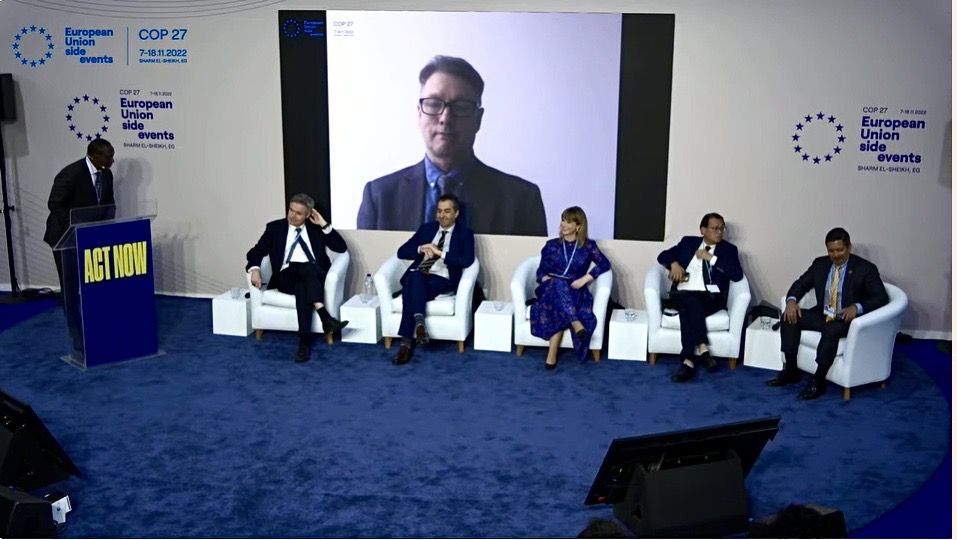COP27: Public-Private Partnerships Crucial for Fast Roll Out of Energy Transitions

African countries must create the regulatory and policy frameworks necessary for investments to flow towards SDG7. These were the main messages on the 8th of November, when the European Commission’s (EC) Directorate-General for International Partnerships (DG INTPA) and the Africa-Europe Foundation (AEF) hosted the event ‘Rolling-out the AEGEI: accelerating its implementation’ at the COP27’s EU Pavilion.
The moderator of the event Dr Kandeh Yumkella, Co-Chair of the Africa Europe Foundation Strategy Group on Energy opened the session and urged the speakers to discuss innovative ways to implement and rollout of the Africa-EU Green Energy Initiative (AEGEI). In his opening remark Mr Yumkella emphasised the importance of focusing on practical actions and programs that will help tackle climate change, while ensuring a just and equitable transition.
“Climate change is no longer a technical challenge, we have solutions for the problems that we are experiencing, technical ones, and it’s a political challenge, and a human and a collaboration challenge that we must solve”. – Johan van den Berg
Explaining the content of the AEGEI and the plans for rolling out the initiative, Mr Stefano Signore, Head of Unit DG INTPA F1 Sustainability Energy Climate Change and Nuclear, EC, representing Ms Carla Montesi, Director for the Green Deal and Digital Transition at the EC, underlined the importance of the current, close energy cooperation between Africa and EU. Mr Signore mentioned the need to build on this foundation under the new financial framework of the AEGEI. The initiative was proposed by Team Europe at the AU-EU Summit in February 2022 making energy access one of the main pillars of its Green Deal cooperation with Africa.
Breaking down the details of the financial requirements, Mr Yumkella noted that Africa will need EUR 50 billion annually for sufficient energy generation, plus roughly EUR 20 billion for maintenance. He asked the panellists what the significance of the EUR 2.4 billion, envisioned to be rolled out withing the AEGEI, can be within this context. Markus Berndt, Acting Managing Director of the Global Directorate, EIB, clarified by differentiating between the EURO 2.4 billion, which is the budget fund that will used to de-risk the investment projects, and the approved funding in Africa of EUR 150 billion from the European Investment Bank and other development institutions as was proposed by Team Europe. Speaking from an African Member States perspective, Carlos Yum, Managing Director at Mphanda Mkwawa Hydro, Mozambique, added and emphasised the importance of partnerships with the investment banks, EU, and other institutions for the development of their ongoing project to address conventional power and renewable power in the country.
Public-private partnerships can play a pivotal role
Siemens Gamesa’s Anna Beranek, Global Head of Communications and Government Affairs, discussed the need for governments to implement appropriate policies and regulations, streamlining permitting schemes, investing in the acceleration of renewable electricity grid construction, and having a stable regulatory framework between the public and private sector to meet the Africa’s doubling population and energy demand, which is projected to triple by 2040. Glenn Pierce-Oroz, Senior Director of International Relations and Special Projects, Sustainability Energy for All (SEforAll), added that there is also a need to strategies with proper analytical work, planning and capacity building, to make the process as sustainable as possible
Johan van den Berg, Head of Secretariat, Africa-EU Energy Partnership (AEEP), remarked on the significance of the Africa EU Green Energy Initiative and said he was encouraged to observe the public-private actors during the panel. He advocated for a much wider range of participants, including civil societies in the efforts to accelerate energy transitions.
In their closing remarks the panellists highlighted the importance of clarity in decision making and speed in implementation:
Glenn Pierce-Oroz: Private firms would like to know what they should achieve, in line with government policies and regulations, in six months or next year, so that they can put in place processes that assist with affordable energy transitions and climate goals.
Carlos Yum: Looking for a better regulatory framework with constant support from the EU and other institutions along with institutional taxes can support and fast-track the energy transition and make it a reality.
Anna Beranek: For wind turbine manufacturers like Siemens, it would be crucial to know if the wind industry is seen as a strategic sector and gets all the necessary funding and support from the government, just like other strategic sectors are getting to reach their goals on the African energy transition.
Stefano Signore: The European Commission has highlighted the necessity to fulfil several of its announced objectives and to have a more in-depth discussion with partner nations in order to move forward with the various ongoing work tracks. There is no room for complacency.
Marcus Berndt: We need for courageous politicians, entrepreneurs, and investors who look for the opportunity to force change. There is also the need for a strong planning framework and a good framework for investments.
Johan van den Berg: Work can speed up and it is inspiring to witnessing the development on the ground.





